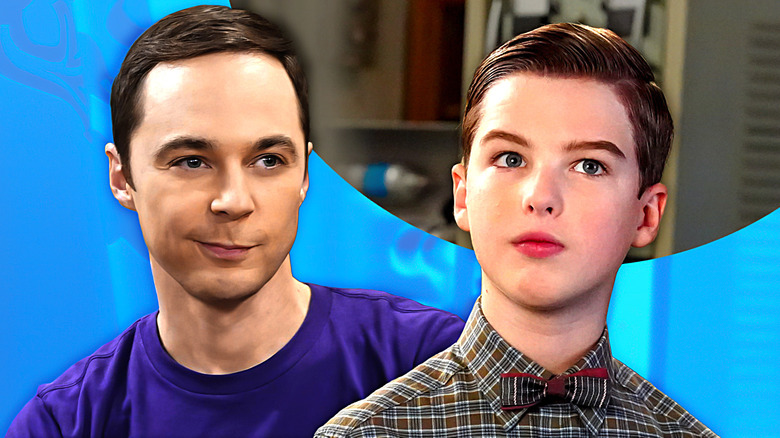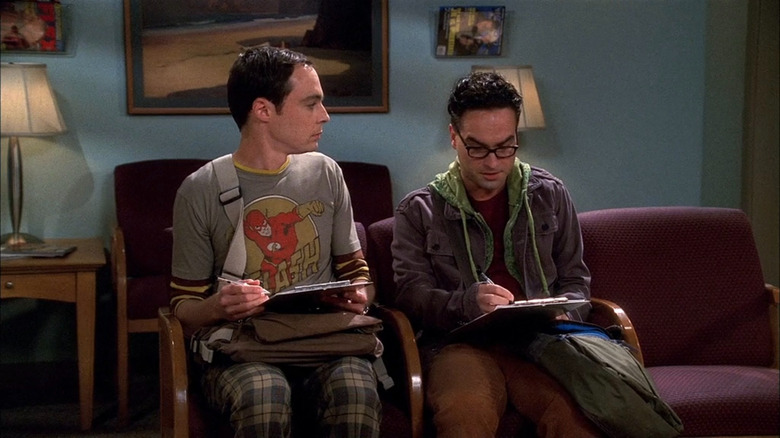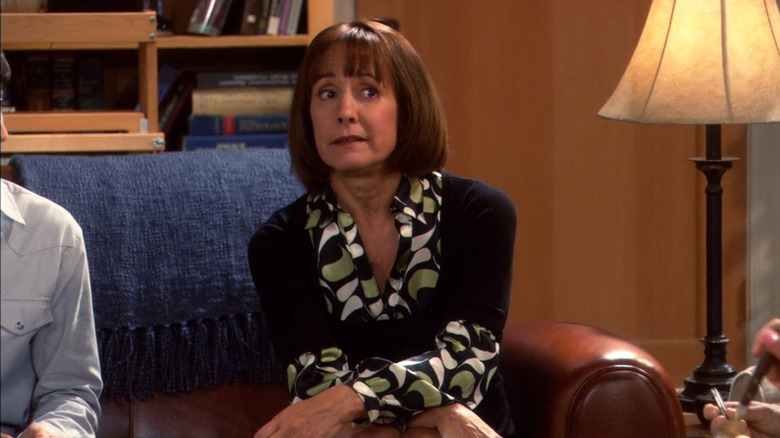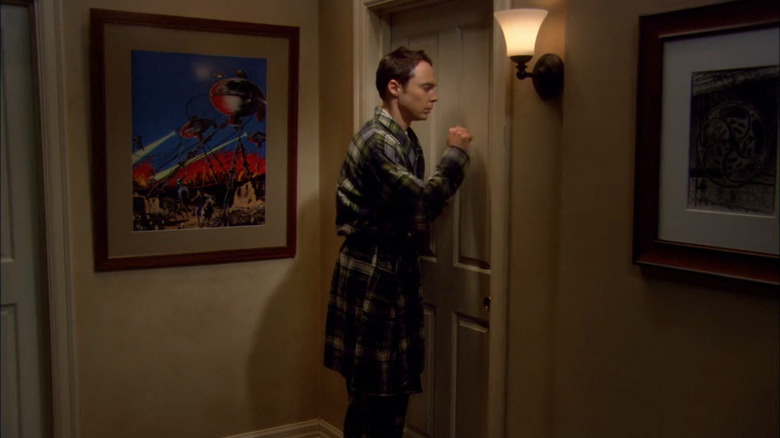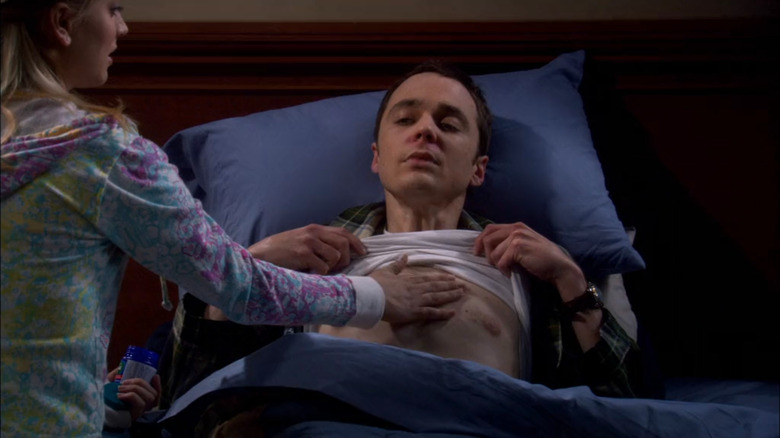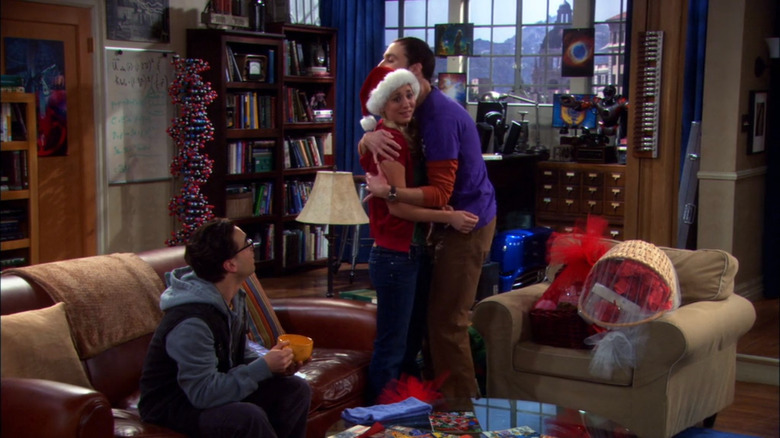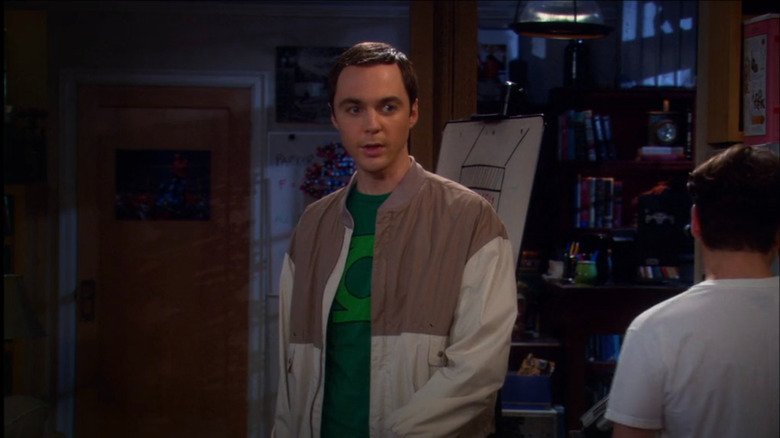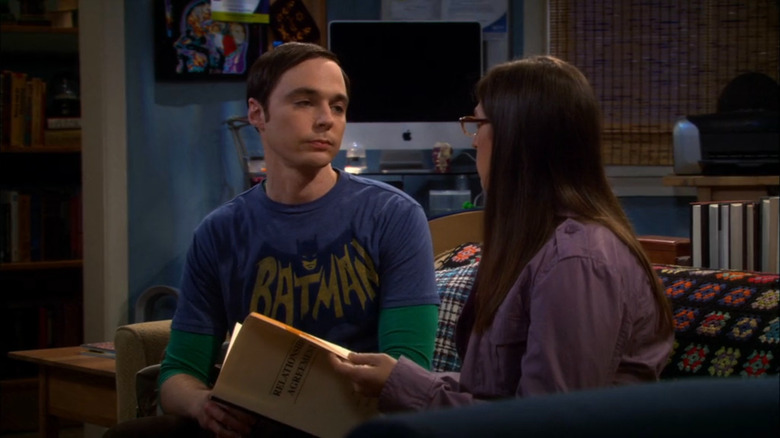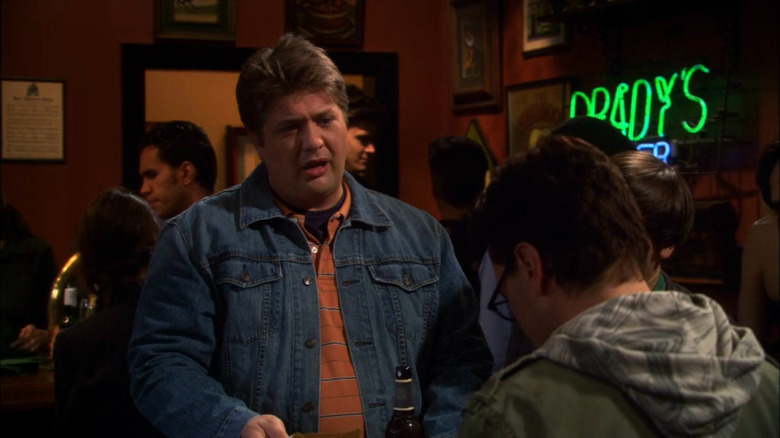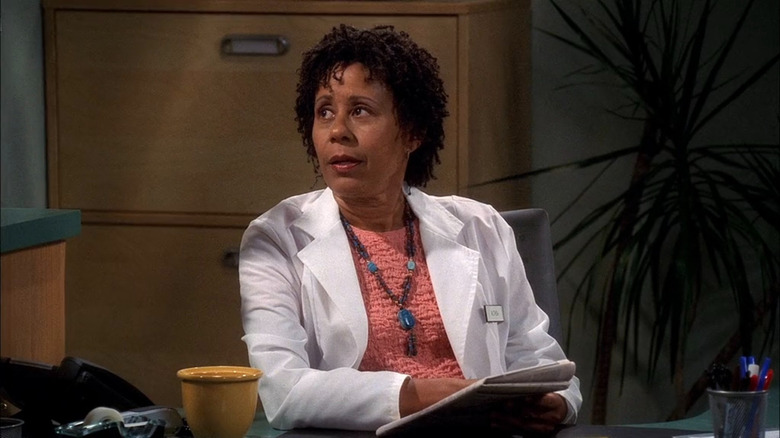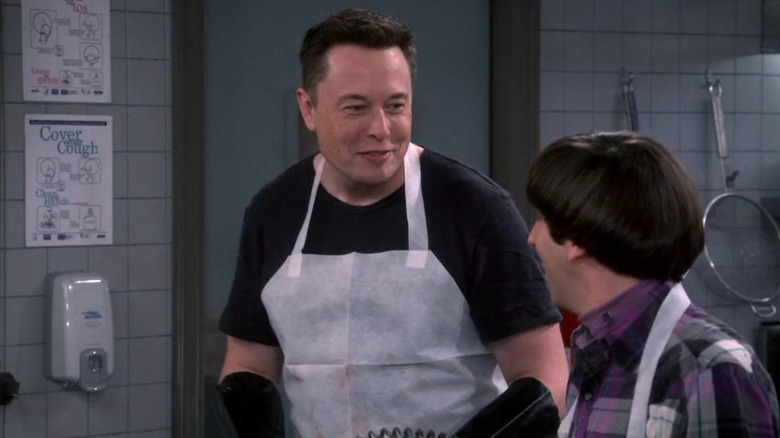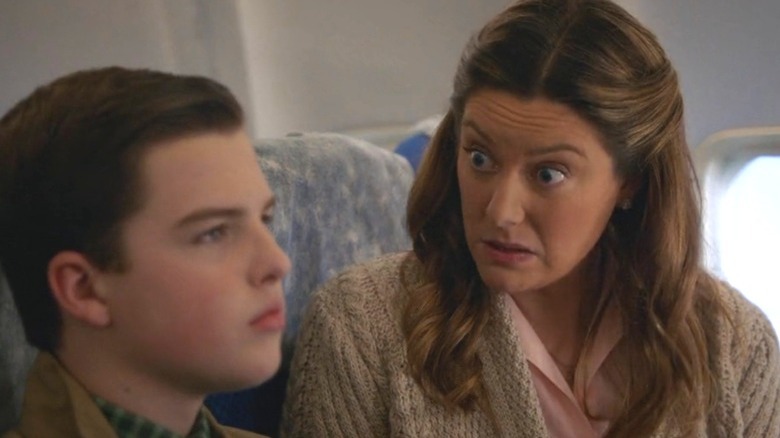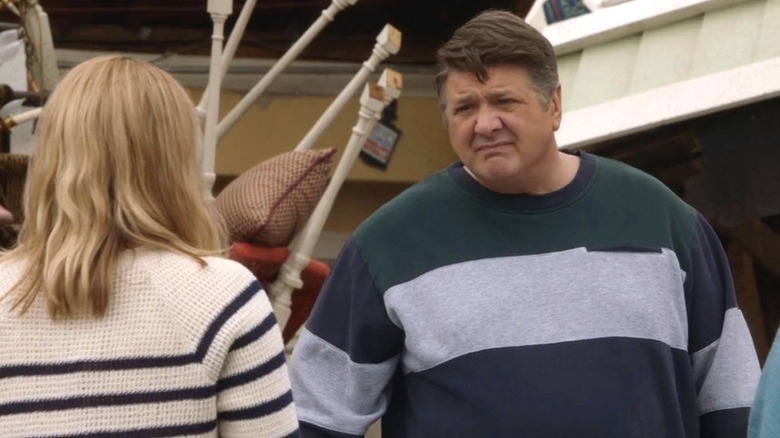We Rewatched Big Bang Theory And It's Completely Different After Young Sheldon
The end of "Young Sheldon" has finally come to pass, leaving us with a complete (and only slightly edited) story of one of the most well-known sitcom characters of the 21st century. For seven seasons, the younger version of Sheldon Cooper (originally played by Jim Parsons but portrayed here by Iain Armitage) colored in the corners of the "Big Bang Theory" universe. The prequel series brought back fond memories of the mothership show with each sly reference, all the while trying to patch the various plot holes created by the spin-off itself. Together, the two shows represent a herculean feat of modern television writing, and for that alone they deserve some praise.
But, the end of "Young Sheldon" left "The Big Bang Theory" fans with something other than nostalgia — a gap in their weekly viewing schedule. For the first time since "The Big Bang Theory" aired in 2007, there are no ongoing series within this world to watch. Fans now have a lot of time on their hands (at least until the Georgie and Mandy spin-off debuts), so rewatching the original series makes a lot of sense. That's exactly what we did, and — though it was well worth the walk down memory lane — we feel we should warn viewers of what lies ahead. Even though most of the laughs are still there, it's hard to see "The Big Bang Theory" in the same way after watching "Young Sheldon." Here's why.
Sheldon's trademark graphic tees are a huge deal
As we rewatched our way through "The Big Bang Theory," we came to appreciate all the meaningful character details that "Young Sheldon" added to the lore. Case in point: Older Sheldon's unique fashion style, which rears its loud and nerdy head in the series premiere. The faded graphic tee, long-sleeve undershirt combo quickly defined the character's look throughout the entire series, causing him to stick out aesthetically as much as he did socially from his more stylish or professionally dressed friends.
However, even the most casual "Young Sheldon" viewer will know this wardrobe did not carry over to the spin-off prequel series, in which the younger Sheldon deliberately wears a bow-tie and button-down from an elementary school age. In fact, as the series revealed, Sheldon's science-nerd side didn't even start to fuse with his comic-book-nerd side until after he met Tam Ngyuen in "Young Sheldon" Season 1.
The more Sheldon developed his social skills throughout the series, the more he was able to pick and choose when to show off this relaxed aspect of his personality — an evolution punctuated at the end of "Young Sheldon" Season 5 by him donning a Flash graphic tee. Sure, Sheldon's style may arguably be to blame for those Target tees that mirror current trends and annoy longtime fans of whatever property is the flavor of the month, but, in-universe, these tees are the inevitable by-product of one boy's lifelong battle for social acceptance.
Didn't the Coopers have a family dog?
In "The Big Bang Theory," Sheldon clearly states on two separate occasions — both times in Season 1 — that he used to have a dog. And yet, though we explored all the darkest corners and crevices of Sheldon's childhood in "Young Sheldon," not once did we meet this Cooper family dog that allegedly existed at some point in this universe. The spin-off series actually goes so far as to write Sheldon as being so afraid of dogs that it's impossible to imagine that version of the family ever having one.
We're far from the first to point this out — "The Big Bang Theory" fans have been striking their keys about this exact issue for several years now. Unfortunately, no one so far has been able to come up with an answer beyond a shrug and an acknowledgement that "The Big Bang Theory" never had the strongest continuity. That's especially true for the first season, during which the writers and actors were probably still discovering who these characters were.
These things happen with shows that prove to be big hits and go on for longer than anyone could have hoped when the first episodes were being created. Still, it's annoying when you rewatch the show, especially because a Cooper family dog could have provided countless storylines. Of course, we could pin the dog's omission from "Young Sheldon" on Sheldon himself — the spin-off essentially confirms that he's an unreliable narrator.
Sheldon's knock isn't all that sad anymore
Sheldon makes a point of knocking loudly three times before entering any room in "The Big Bang Theory," almost without exception. It took almost a decade for fans to learn the tragic truth behind the knock — that Sheldon performs it out of a compulsive abundance of caution caused by him accidentally walking in on his father cheating on his mother. From the moment this was revealed, Sheldon's knock became less of a running gag and more of a reminder of how traumatized this somewhat cartoonish character really was.
The story behind the knock was altered in "Young Sheldon." Fans were anxious to see how the spin-off would handle such a dark and impactful moment for its title character. Instead, the prequel series chose to undo the previous twist entirely, revealing that Sheldon only believed he had caught his father cheating. In reality (or, at least, the reality of Sheldon's memoir), Sheldon walked in on his mother and father when they were in the midst of an elaborate roleplaying scenario, which involved the former wearing a wig and using an accent.
Fans of "The Big Bang Theory" will likely be split over this change for years to come. Some are no doubt frustrated by how it deflates some of Sheldon's complexity, while others will surely be relieved because it goes some way to repairing George Cooper's reputation. Either way, you definitely won't be feeling as sorry as you once did for Sheldon when you see him knocking away during your "The Big Bang Theory" rewatch.
Sheldon's favorite lullaby gets better every time
One thing that makes a rewatch of "The Big Bang Theory" a bit uncomfortable is seeing all the ways the earlier episodes force Penny (Kaley Cuoco) into parenting the four main male characters. When Sheldon comes down with a cold in Season 1, Episode 11, "The Pancake Batter Anomaly," he expects Penny to rub vapor lotion on his chest while singing the lullaby "Soft Kitty" — the same ritual his mother used to perform when he was a little boy.
Though the resulting scene is either genius cringe-comedy or merely a cringey attempt at comedy, it has undeniably benefitted from the song's eventual use as one of the series recurring gags. As the relationship between the various characters evolved from uncomfortable strangers and/or school friends into members of a chosen family, such favors as singing "Soft Kitty" stopped being cringe and became endearing. This first instance of Penny singing the tune will be even sweeter for those who have seen young Mary sing it to her sick son in "Young Sheldon."
Penny's gift to Sheldon is even sweeter now
Penny and Sheldon share a tender moment in "The Big Bang Theory" Season 2 episode "The Bath Item Gift Hypothesis." As the title alludes to, Sheldon and his friends spend the entire episode trying to correctly determine the amount of bathroom supplies he has to buy for Penny in order to match the value of the mystery Christmas gift she's got for him. His casual and routinely unacknowledged sexism aside, the storyline culminates in one of the series' strongest emotional beats when Sheldon discovers that she's procured for him a napkin bearing the signature and DNA of Leonard Nimoy.
The scene already carried extra weight due to Nimoy's passing in 2015, an event that "The Big Bang Theory" paid tribute to on multiple occasions. Those who have seen "Young Sheldon" will know that Nimoy's "Star Trek" character Spock held great personal significance for the boy. In Season 1, Episode 9, "Spock, Kirk, and Testicular Hernia," Sheldon shared that he identified with the Vulcan's dual heritage — likely a surface reflection of his own struggle to express emotion and connect with others. With this in mind, the fact that Sheldon is so overcome by emotion that he must offer Penny a grateful hug is a perfect example of just how well these two shows click when they're able to work together.
Bazinga got an origin story
If "Young Sheldon" faced one inevitable challenge during its run, it was the apparent necessity for it to somehow explain the origins of "Bazinga!" This catchphrase was so recognizable and culturally ubiquitous that it became synonymous with "The Big Bang Theory" even among the series' detractors. "Bazinga!" arguably needed to have an origin story in "Young Sheldon" for the spin-off to make good on its premise.
To its credit, "Young Sheldon" approached this "reveal" with an unusually light touch. Rather than force it into some tragically or hilariously important moment in his childhood, "Bazinga!" is simply shown to be a part of a random novelty toy company's slogan. Hearing it pop up in "The Big Bang Theory" now, it's totally believable that Sheldon would have hung onto this bizarre word from his childhood — a fun safety-net he can always fall back on to try and connect with others.
Multiple people involved with the show — including Jim Parsons himself – have stated that "Bazinga!" was first added to a script in the middle of an episode taping. This addition was reportedly inspired by "The Big Bang Theory" writer Stephen Engel, who used the word as a catchphrase when he pranked people in real life. He reportedly once used it after giving co-creator Bill Prady a grapefruit that he had hollowed out and somehow put back together.
Relationship Agreements seem like a great idea
Of all Sheldon's many idiosyncrasies, you could argue that none have aged better than his famous Relationship Agreements. In this day and age, it often seems like there's no problem that couldn't be solved more effectively via communication and boundaries, things that are established in the notoriously detailed contracts Sheldon draws up. Even if you personally find them to be too formal for a functioning relationship, "Young Sheldon" does make it hard not to see their utility in his life.
As revealed in the spin-off, Sheldon first realizes how useful a contract could be when he's caught in the middle of an argument between his Meemaw (Annie Potts) and his professor Dr. John Sturgis (Wallace Shawn). Underneath all the legal jargon, we can see young Sheldon learning how to communicate his own boundaries while also learning to respect those of others. It's a characteristically mature solution to an equally mature problem, and its origin makes it just a bit more realistic that Sheldon was able to maintain so many complicated lifelong relationships.
Leonard's bully sure looks familiar
When you reach "The Big Bang Theory" Season 5, Episode 11 in your rewatch, you'll encounter a character called Jimmy Speckerman, the bully who tormented Leonard Hofstadter (Johnny Galecki) in his youth. To be honest, the exact plot doesn't concern us — and it certainly won't concern you once you realize Jimmy is played by Lance Barber, the actor who went on to play Sheldon's father George in "Young Sheldon."
As one of the most prolific character actors working today, it's actually very common to see Barber's face pop up in just about any sitcom you can think of. From "Black-ish" and "Brooklyn Nine-Nine" to "How I Met Your Mother" and "Joey," he's turned what could otherwise be boring one-off bit-parts into memorable characters. Occasionally his work is so striking that his character is brought back several times, as was the case with Bill Ponderosa in "It's Always Sunny in Philadelphia."
All this to say, the fact that Barber showed up as a reformed bully a few years before he was cast as George Sr. likely isn't evidence of some fifth-dimensional chess maneuver by the series' creators. Rather, Barber was precisely the sort of guest actor that thrived on "The Big Bang Theory," with his work on the show likely earning him a unique advantage during the casting process for "Young Sheldon."
There are several returning actors
Lance Barber isn't the only character actor playing double-duty. When casting supporting characters and cameos in "Young Sheldon," it seems the recruitment team didn't dig too far into their files to find the right actors for the jobs. After appearing in the pilot as a sarcastic sperm bank nurse, Vernee Watson played Nurse Althea in five more episodes of "The Big Bang Theory." She was then invited to play the role of Nurse Robinson in the first two seasons of "Young Sheldon."
Melissa Tang also got invited to appear in the spin-off, playing string musician Ms. Fenley. On "The Big Bang Theory," she played Mandy Chow, the marine biologist who almost breaks up Leonard and Penny at the beginning of Season 9 (just one of the strange things we came to accept about Leonard and Penny's relationship). Meanwhile, Teller of the famous magic duo Penn and Teller played Sheldon's father-in-law Larry Fowler on "The Big Bang Theory" before he and his partner portrayed loose parodies of themselves on "Young Sheldon."
The fact that the prequel series makes an active choice not to take itself too seriously as part of a shared universe (at least not to the level of Marvel or Star Wars) genuinely helps "Young Sheldon" feel like a less-cynical artistic endeavor, while also giving "The Big Bang Theory" fans a new look at some familiar faces.
Howard wouldn't have had pie with Elon Musk if not for Sheldon
Speaking of people who appeared on both "The Big Bang Theory" and "Young Sheldon," Elon Musk played himself when he appeared in an episode of each show. Though it isn't totally surprising that someone like Musk would be interested in a cameo (the series attracted a very specific type of celebrity guest star, thanks in part to its reputation for being scientifically accurate), the lore the series writes for him is actually kind of shocking.
In "Young Sheldon" Season 1, Episode 6, it is revealed that Musk came up with a design for reusable landing rockets after looking over the discarded notes of a young Sheldon Cooper. This would imply that when Musk and Howard Wolowitz (Simon Helberg) meet in "The Big Bang Theory" Season 9, Episode 9, "The Platonic Permutation," Musk just so happens to be currently working on a project made possible by their mutual friend.
It's been almost a decade since that episode first aired, and Musk's fame has continued to grow in that time. He's a more polarizing figure these days, and when you watch his cameos back, you can't help but wonder if the creators would have been quite as eager to bring him on board if the show was being made today. Writing in 2024, one Reddit user said: "This 2015 Elon Musk cameo in 'The Big Bang Theory' was his PR trying to portray him as a philanthropic billionaire helping do dishes at a homeless shelter on Thanksgiving Day. We all know what his actual views are a decade later."
The reason for Mary's hard religious turn is tragic
Sheldon's parents may have been subjected to certain dramatic liberties during his "writing process." This would be one way to explain why their personalities are so different from how they are seen and described in "The Big Bang Theory." Mary, for instance, only takes her family to church as part of a covenant she made during her second pregnancy. And yet, in "The Big Bang Theory," hardly a scene goes by without the character (played by Zoe Perry's real-life mom, Laurie Metcalf) somehow mentioning her faith.
Was Sheldon for some reason in deep denial over his mom's reliance on a non-scientific force? It's certainly possible, and reasonably in-character. However, we think it's more helpful to take Sheldon's "memoir" at face value in this case — as seen in the "Young Sheldon" series finale, Mary apparently doesn't make her hard religious turn until after George Sr.'s death. From this perspective, it seems clear that Mary is mourning through her religion, which also tracks with her turning to prayer during Missy's birth when she was at her least religious.
If that was enough to forge a lifelong covenant between her and her god, it seems unavoidable that George's death would cause her to become even more invested than before. And when Mary appears on "The Big Bang Theory," it can't help but feel like she's still trying to cope with the loss after everything we now know from "Young Sheldon."
Sheldon really wanted to love his dad
George Cooper Sr. is a much harder nut to crack than his wife. Throughout "The Big Bang Theory," the late patriarch is portrayed through remembrance alone as a good-for-nothing leech who was more interested in booze and sex than he was raising his children. Then, when "Young Sheldon" comes along, George Sr. is suddenly a tame, respectable father who worked hard to provide for his family before tragically dying long before his time.
By the time you've finished your rewatch of "The Big Bang Theory," you may find yourself sure of which version of George was real. The "Young Sheldon" finale seems to confirm our own bittersweet solution to this plot-hole: Sheldon deliberately "wrote" George in a more flattering light to reflect the newfound grace and respect he seemingly has for his dad, now a new father himself. It seems likely that Sheldon had been trying to make peace with his relationship with his father's memory during "The Big Bang Theory," making every mention of him an opportunity to reflect on the complexities of both series as well as Sheldon's journey as a whole.
